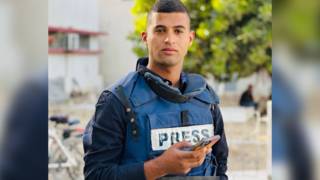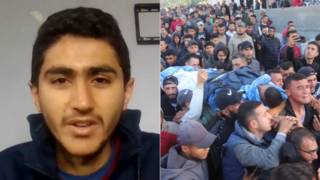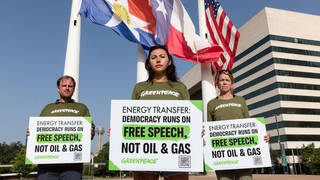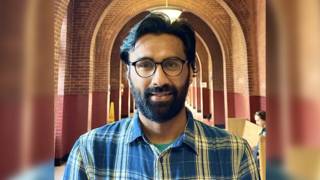
Topics
Guests
- Jay O'Haraco-founder of the Climate Disobedience Center and one of the lobster boat blockaders arrested in 2013 after they used their lobster boat to block a delivery of some 40,000 tons of coal to the Brayton Point Power Station in Somerset, Massachusetts.
- Afrin Sopariwalamember of Climate Direct Action and a part of Women of Color Speak Out, a climate justice collective.
Ten climate activists were arrested Tuesday for attempting to shut down all tar sands oil coming into the United States from Canada by manually turning off pipelines in Minnesota, Montana, North Dakota and Washington state. The group, which calls itself Climate Direct Action, includes five activists and five other supporters and videographers. They posted pictures and videos online that showed them cutting chains and turning the manual safety valves to stop the flow through the pipelines. The activists issued a statement on Tuesday saying the action was in support of the call for International Days of Prayer and Action for Standing Rock. They also called on President Obama to “use emergency powers to keep the pipelines closed and mobilize for the extraordinary shift away from fossil fuels now required to avert catastrophe.” While all 10 activists remain in jail, we speak Jay O’Hara, co-founder of the Climate Disobedience Center, and Afrin Sopariwala, a member of Climate Direct Action and a part of Women of Color Speak Out, a climate justice collective.
Transcript
JUAN GONZÁLEZ: Nine climate activists were arrested Tuesday for attempting to shut down all tar sands oil coming into the United States from Canada by manually turning off pipelines in Minnesota, Montana, North Dakota and Washington state. The group, which calls themselves Climate Direct Action, includes five activists and four other supporters and videographers. They posted pictures and videos online that show them cutting chains and turning the manual safety valves to stop the flow through the pipelines. This is climate activist Leonard Higgins.
LEONARD HIGGINS: I’m in Coal Banks, Montana, just north of the Missouri River, at a block valve on the Spectra Express pipeline. It carries tar sands oil from Canada down into the U.S. for refining. And we have to stop especially burning coal and tar sands oil. They are major emitters of the carbon dioxide that is causing the planet to heat. In Paris, 192 nations agreed that we need to keep global warming to a limit of 1.5 degrees centigrade. And it’s obvious from the science, what we’re hearing, that we’re going to blow right past that. And we’re in a state of emergency to protect our loved ones and our families, our communities. We need to step up as citizens and take action where our leaders are not. And so that’s what I’m prepared to do when I close the valve, along with the other team.
AMY GOODMAN: That was Leonard Higgins at the site of the Spectra Energy’s Express pipeline in Coal Banks Landing, Montana. This is Emily Johnston, waiting to turn the valve at one of the Enbridge lines in Minnesota.
EMILY JOHNSTON: When it’s done doing that, we’ll do this one, which, with any luck, will mean they can’t undo it. And [inaudible] over there.
JUAN GONZÁLEZ: The activists issued a statement Tuesday saying the action was in support of the call for International Days of Prayer and Action for Standing Rock. They also called on President Obama to, quote, “use emergency powers to keep the pipelines closed and mobilize for the extraordinary shift away from fossil fuels now required to [avert] catastrophe.”
AMY GOODMAN: The activists issued a statement on Tuesday, as Juan just said, calling for the International Days of Prayer and Action.
We’re going to turn right now to Jay O’Hara, co-founder of the Climate Disobedience Center and one of the lobster boat blockaders arrested in 2013 after they used their lobster boat to block a delivery of some 40,000 tons of coal to the Brayton Point Power Station in Somerset, Massachusetts. We’re also joined by Afrin Sopariwala. She is a member of Climate Direct Action, a part of Women of Color Speak Out, a climate justice collective.
Why don’t we begin first with Jay? If you can lay out this whole multistate action and what took place yesterday?
JAY O’HARA: Thanks, Amy. So, around 6:30 a.m. Pacific time yesterday morning, we began in Minnesota with teams of activists approaching these safety valves that are placed along the routes of these pipelines in Minnesota, North Dakota, Montana and Washington state, and, in 15-minute intervals, calling the pipeline companies to let them know that we were going to be doing this, so that they could safely shut down and manage their pipelines, and then proceeding to close those valves at the locations where the activists were.
JUAN GONZÁLEZ: Well, Jay, it’s really astonishing to realize that you were able to organize this, and there were no security guards on these—near these valves to be able to prevent your group from doing this.
JAY O’HARA: Well, I think—I think, certainly, there weren’t—there’s no security guards. They’re simply usually just enclosures surrounded by a chain-link fence, with maybe some barbed wire across the top of it. You know these valves really are for safety, and they are to be used when there is a leak or a spill or a problem along the line to shut down the flow of oil. So, these aren’t, you know, designed to be heavily guarded. They’re in fact supposed to be accessible safety equipment, in some ways.
AMY GOODMAN: So, Afrin, can you talk about how you got involved with this, the risks people are taking in all these states, from North Dakota to Minnesota to Montana, Washington state?
AFRIN SOPARIWALA: Absolutely. So, a lot of these people who took arrest and risk yesterday worked—have worked together for several years. And I’ve worked with them during Shell No last year and also Break Free earlier this summer. And a lot of research has been done into wanting to do this action. And so, as things started to get together, I was—I got pulled in.
People have taken this risk—and these are ordinary people. These are parents and grandmothers, concerned citizens, who, after years and years of all kinds of different actions in the legal—in the legal realm of actions that we can do, came to a point were they felt morally compelled to engage in civil disobedience and nonviolent direct action and put their bodies in the line, knowing that this risk was—was not just going to be one day or one night in jail, but something that they will, you know, see over the course of the next few months, at least.
AMY GOODMAN: Responding to a request from Democracy Now!, Enbridge, Spectra and Kinder Morgan all condemned the actions. Kinder Morgan stated, quote, “reckless trespassers,” unquote, broke into their location, but that they were not operating through the portion of the line that was targeted. Spectra Energy stated, quote, “Tampering with energy infrastructure places both the community and the environment at risk,” unquote. They temporarily shut down the section of the Express pipeline that was impacted, and report that it was restarted a few hours later. And Enbridge Energy called the action, quote, “reckless and dangerous,” unquote, adding, quote, “These are criminal acts that endanger the public and the environment. We take this very seriously and will support prosecution of all those involved.” Jay, how many people got arrested? And what are they being charged with?
JAY O’HARA: Well, I’ll answer that in a second, Amy, but, first, it’s just beautiful to hear the words of those pipeline companies, because that is exactly the words that we need to be using to describe what their corporations and the fossil fuel industry is doing to our planet: reckless endangerment and reckless operation. So, I’m looking forward to being able to read those full statements, so we can really turn them around and republish them as our own words.
Actually, at this point, there are now 10 people under arrest. An additional support person was arrested late yesterday in Montana. So, that includes the five activists who turned the valves themselves, as well as five folks who were there in some sort of support role, who generally did not trespass within the enclosures of the pipeline companies, as well as videographers who were part of a documentary team who were covering the action. So, last night, in jails in four different states were not only people, five people, who, with their hearts really open, were prepared to go and take action with the knowing consequences that they would potentially face these legal consequences, but also five folks who were there acting out of love and support for their friends, as well as people who were simply there to document what was happening.
JUAN GONZÁLEZ: And, Afrin, could you talk about your decision to take these actions in solidarity with Standing Rock?
AFRIN SOPARIWALA: Yeah, absolutely. So, you know, as you mentioned earlier, Standing Rock put out this call, international call, for prayers and action. And we are absolutely responding to that, because what’s happening in North Dakota is so historic and so important. And around the world, as well, we’re seeing frontline communities and indigenous communities who are facing climate impact today. I am from India, and people are dying every year back home because of heat waves. And also, we have the privilege here to take direct action in ways that we are able to. I read news about four people in India who were shot for protesting at a coal power plant. And those are people whose lives are already—who are already victims of the climate crisis. And so, it is our duty and responsibility to act in solidarity with indigenous people and frontline communities around the world, and also with this historic moment in Standing Rock.
AMY GOODMAN: Jay, I wanted to ask you a quick question about your past, because we had you on, along with one of the people you were involved with this action in Massachusetts—and you could explain it briefly—and the highly unusual turn of events when your prosecutor came out on the steps of the courthouse and said he supported what the two of you did.
JAY O’HARA: Yes. So, in 2013, we—Ken Ward, who is one of the valve turners, the valve turner here in the state of Washington outside of Anacortes on this action—Ken and I were aboard a small, little white lobster boat that we anchored in the path of an incoming coal shipment to a power plant in Massachusetts. And I think the—what was amazing about that action, while it was exactly the sort of heartfelt expression of what we need to be doing on the day of the action, that same spirit seemed to carry through all the way into the courtroom almost a year and a half later, when the prosecutor, District Attorney Samuel Sutter, came into the courtroom and said, essentially, as we were prepared to prove in court that our actions are necessary—were necessary to avert the climate catastrophe, that in fact he had great sympathy with us and couldn’t, in some ways, in good conscience, argue that these sorts of actions are necessary in the face of government and corporate inaction, and declared then on the steps, waving Bill McKibben’s most recent article in Rolling Stone, that he’d join us during the People’s Climate March in New York City in 2014, which he did.
AMY GOODMAN: And that’s where I saw the three of you marching together, and we interviewed you.
JAY O’HARA: Indeed. Indeed, we were—we were there marching together for three or four hours.
I think what’s interesting and beautiful about this action, similar to the action that Ken and I took a few years ago, is that this whole team approached this action with the same spirit of love and compassion and grief that the world that we are living in is not the world that we need, that the future we are leaving for younger people and generations to come is going to be disastrous, and that with that very deep, heartfelt sense of having no other recourse to change the course of events, these folks beautifully have gone out and taken the action that was necessary, in the face of what could be some serious consequences personally for them, but in light of the serious consequences already felt by people around the world, they knew that they had to act.
AMY GOODMAN: We want to thank you both for being with us. Of course, we’ll continue to follow these actions. Jay O’Hara, thanks so much for joining us—
JAY O’HARA: Thanks.
AMY GOODMAN: —from Climate Disobedience Center. And Afrin Sopariwala of the Climate Direct Action, as well as Women of Color Speak Out. And we will soon be reporting on the ground in North Dakota, covering the Standing Rock struggle dealing with the Dakota Access pipeline. This is Democracy Now!, democracynow.org, The War and Peace Report. We’ll be back in a minute.












Media Options